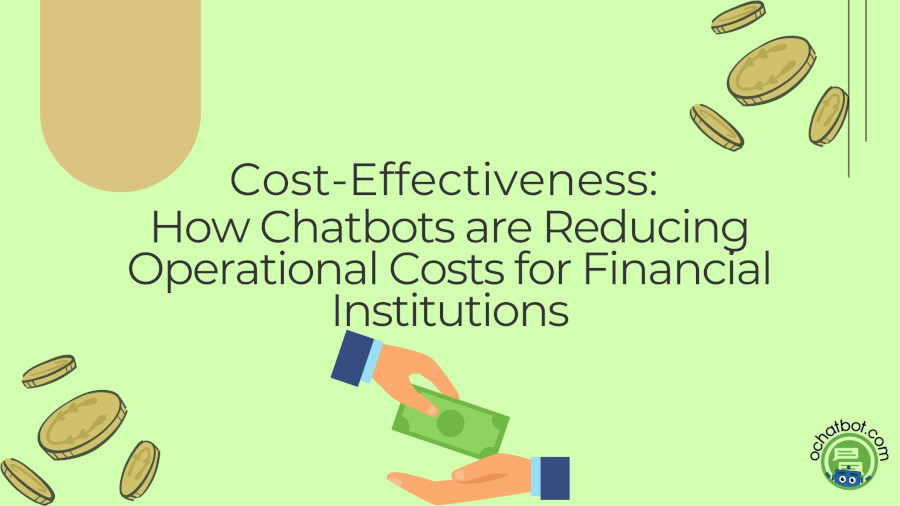In an age of rapid technological advancement and changing customer expectations, financial institutions grapple with the dual challenge of staying competitive while managing operational costs efficiently. With the emergence of digital banking and the increasing demand for seamless customer experiences, the financial sector finds itself at the crossroads of transformation. One technology that has stepped up as a powerful ally in this endeavor is the chatbot.
Chatbots, driven by artificial intelligence (AI), are spearheading the evolution of financial services. They represent a fusion of technology and finance, offering benefits that extend far beyond basic customer support. In this article, we will delve into the world of chatbots and explore how they are playing a pivotal role in reducing operational costs for financial institutions while simultaneously enhancing customer satisfaction.
The Rise of Chatbots in Finance
The adoption of chatbots in the financial industry is not a recent development but rather a response to the evolving demands of customers. As customers increasingly seek immediate solutions to their financial queries and requirements, chatbots have emerged as a practical solution. As we mentioned to customers, as chatbots and their services are still new, there are some helpful ways to adapt easily such as using educational platforms with useful information such as investfox.com or others which will help you to know more about such innovations.
Chatbots are AI-driven software applications designed to simulate human-like conversations. They possess the capability to handle a wide range of customer interactions, from answering fundamental queries about account balances to assisting with intricate transactions and offering investment recommendations. What makes chatbots particularly appealing to financial institutions is their round-the-clock availability, scalability, and ability to handle multiple customer inquiries simultaneously.
Automating Routine Tasks
One of the most compelling advantages of chatbots is their capacity to automate routine tasks that were previously managed by human agents. In the world of finance, countless tasks fall into this category, including balance inquiries, transaction history requests, and password resets. By entrusting these tasks to chatbots, financial institutions can substantially reduce the workload on their human agents.
Consider the scenario of a customer wanting to check their account balance. In the past, this would involve a visit to a physical branch, the use of an ATM, or a call to customer support. Each of these methods consumed valuable time and resources. With chatbots in place, customers can simply type their request into a messaging platform or a mobile app and receive an instant response. This not only elevates the customer experience by providing convenience but also liberates human agents to concentrate on more intricate and value-added tasks.

Generative and Scripted AI to engage shoppers in conversational eCommerce.
Create happy customers while growing your business!
-
1 out of 4 shoppers make a purchase on average*
-
5% to 35% Increase in AOV*
-
25% to 45% Reduction in Support Tickets
WE GUARANTEE RESULTS!
Enhancing Customer Experiences
Beyond automating routine tasks, chatbots excel at delivering personalized and efficient customer experiences. Thanks to advanced AI algorithms and machine learning capabilities, chatbots possess the capacity to analyze customer data, allowing them to offer personalized recommendations and valuable insights. For example, a chatbot can suggest suitable investment options based on a customer’s financial goals and risk tolerance.
Moreover, chatbots are paragons of consistency and accuracy. In contrast to human agents, who might display inconsistencies in their responses, chatbots offer consistent and error-free information. This reliability holds significant importance in the realm of financial services, where precision and strict adherence to regulations are of utmost importance.
Cost Savings in Customer Support
Customer support stands as a substantial cost center for financial institutions. Conventional call centers require a substantial workforce to address customer inquiries 24/7. This involves expenses such as salaries, training, benefits, and infrastructure costs. With chatbots, many of these costs can be substantially mitigated.
Chatbots can simultaneously address a high volume of inquiries, delivering immediate responses and resolving issues promptly. This not only diminishes the need for a large customer support team but also reduces operational costs associated with maintaining call centers. Furthermore, chatbots operate 24/7 without requiring breaks or incurring overtime expenses.
By deploying chatbots in customer support, financial institutions can allocate their human agents to more specialized tasks, such as engaging in complex financial planning discussions or assisting with unique customer needs. This not only enhances operational efficiency but also elevates job satisfaction among human employees, enabling them to concentrate on value-added activities.
Compliance and Security
In the highly regulated realm of finance, compliance and security reign supreme. Chatbots are well-suited to address these critical concerns. They can be programmed to adhere rigorously to regulatory guidelines, ensuring that all customer interactions remain compliant with industry regulations.
Additionally, chatbots can bolster security measures. They can verify customer identities through multi-factor authentication, identify suspicious activity, and promptly alert the relevant authorities if necessary. This proactive approach to security serves as a bulwark against fraud, safeguarding both customers and financial institutions.
Scalability and Adaptability
Another distinctive advantage of chatbots is their scalability and adaptability. As the needs of financial institutions evolve, chatbots can be effortlessly customized and expanded to accommodate new services and functions. Whether it involves integrating with third-party financial software or introducing new financial products, chatbots can seamlessly adapt to the evolving landscape.
Moreover, chatbots have the versatility to operate seamlessly across various communication channels, encompassing websites, mobile apps, and messaging platforms. This holistic approach guarantees that customers can conveniently access support and services on their preferred platform at their convenience.
The Future of Financial Services
As financial institutions continue to embrace chatbots and other AI-driven technologies, the financial services landscape is on the cusp of a profound transformation. The cost savings, efficiency enhancements, and enriched customer experiences offered by chatbots underscore their significance in the financial sector.
However, it’s essential to recognize that chatbots are not a panacea. While they excel at handling routine tasks and enhancing customer interactions, human expertise remains invaluable for complex financial decisions and personalized guidance. Consequently, the future of financial services is likely to involve a harmonious fusion of human and AI capabilities.
In conclusion, chatbots are revolutionizing the financial industry by driving down operational costs and elevating customer experiences. Their capability to automate routine tasks, enhance customer support, ensure compliance, and adapt to changing requirements positions them as indispensable tools for financial institutions in the digital age. As financial institutions continue to invest in AI-driven solutions, they are not only optimizing their operations but also shaping the future of finance. The chatbot revolution is here to stay, promising a more cost-effective and customer-centric financial world.
- The Rise of Intelligent Websites - February 19, 2025
- Top Trending Products to Boost Your Shopify Store in 2024 - September 4, 2024
- AI Terms Glossary: Key AI Concepts You Should Know - August 22, 2024


